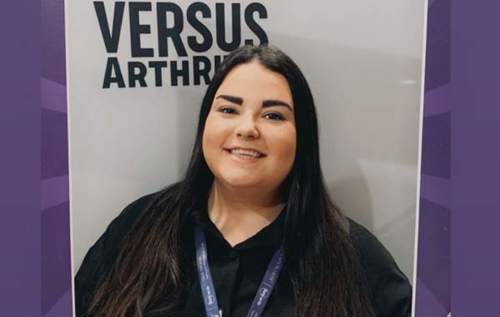Transitioning from uni to work: advice from two people with arthritis
10 February 2023
In the UK, 2.8 million people under the age of 35 live with a musculoskeletal (MSK) condition. While this equates to around a third of the population, many young people living with arthritis find the transition from university to working life challenging.
From balancing working hours with hospital appointments to managing your condition, there’s simply more to consider when you live with arthritis.
But this doesn’t mean that new graduates with arthritis can’t enjoy the transition and find a job they enjoy.
We spoke to two young professionals who’ve experienced it all and have lots of brilliant advice to offer.
Georgia, 23, works in student support at a university. She was diagnosed with juvenile idiopathic arthritis (JIA) at 8 years old, and now has rheumatoid arthritis.
Jasmine, 23, is a trainee pharmacist, and is currently in her final year of her Post MPharm degree. She was diagnosed with JIA at 1, and uveitis at 2.
What was your experience at university like with your condition? What support were you offered?
Georgia: On the open day, my mum and I had a meeting with the inclusion team onsite so I was aware of the Disabled Students’ Allowance and everything they could provide. I didn’t end up applying because I didn’t need anything specific – just understanding.

When I went to university, I was very open with my lecturing team and department. I made the effort to go into lectures but, if I couldn’t, I would always be sent presentations and recordings, or I’d be offered a one to one to go over things. I’d also be given extensions and mitigating circumstances.
Jasmine: My university was really good. I spoke to the disabilities team and they put an Individual Student Learning plan together for me. I can’t fault them at all. I got free taxis to get to lectures which was great for my uveitis during flare ups because there were times that I wasn’t able to drive. I also got a disabled car parking space and recording equipment, which were very handy.
How did you manage hospital appointments when you were at university? Was this something you considered when you chose which university to go to?
Georgia: I decided to stay with my team at home. I chose a university that was far enough away to have a fun experience but close enough that I could go home for hospital appointments. I was away from university life quite a bit with hospital appointments, but I wouldn’t say it impacted my experience too much.
Jasmine: I chose to stay in my hometown of Liverpool for university instead of moving away, because I’m so lucky to have my brilliant hospital team here. My care is spread across 3 hospitals in Liverpool with a joint uveitis-rheumatology clinic.
What was your experience like progressing from university to employment?
Georgia: During my degree I worked at the university as a peer mentoring facilitator and was an education and inclusivity representative. Now, I look after a caseload of students and their welfare and wellbeing. My purpose is to support them and keep them on track for graduation. The main struggle is not everyone is as understanding as the person before. Not all employers are as open and accepting as others.
Working from home is a wonderful opportunity. It allows me to look after myself more.
Jasmine: Working is a lot more challenging. At university, I could work on my own time. I was a lot more comfortable. Now I’m on my feet 9 till 6. I’m adjusting. I have a day off in the week though, which really helps.
When you’re training to be a pharmacist you have to rank where you want to go for your placement. I was disadvantaged because they recommend putting 40-50 places but I only put 5 because I needed to stay in Liverpool to be with my hospital team. I was really lucky that the company I worked with part time during university let me stay with them.
What are some of the challenges you face having arthritis and working?
Georgia: Self-acceptance was my biggest hurdle in the workplace. But I’ve realised there’s so much that an illness can bring that’s positive. I wouldn’t wish my condition on anyone, but it’s given me qualities that I don’t think I’d have had otherwise.
The most important thing is being aware that something might take longer but it doesn’t mean you can’t do it. You need to recognise that first and then take it to your employer.
Jasmine: I picked a standing up job which isn’t ideal. That’s challenging. I’ve become accustomed to having sore knees every day, and being in work worsens them. I can go to the consultation room and sit down doing alternative jobs to rest when I need to, though.
What has your employer done to help and support you?
Jasmine: When I started working full time, my work was quite shocked that I had to go to so many hospital appointments. But they’ve been very supportive. I can only have a certain number of days off to be able to sit my pharmacy pre-reg exam, but they’ve helped by adjusting my days. I now get a day off in the week which gives me time to go to hospital and have a bit of a rest. They’re very flexible.
Do you have any advice on how to approach an employer about having arthritis?

Georgia: Before you accept the job, make sure they confirm what they’re going to do. Don’t let your employer tell you what you need – tell them what you need. Have confidence in knowing that you can do the job. Even though you have a chronic illness, you can still be what you want to be.
Be open and honest from the beginning. Mention the positives – it’s not all negative. When I applied for my current job, I talked about how I could be a support for people with disabilities because I understand it. You can always bring a different angle to the team.
What do you hope for the future?
Georgia: I want to carry on making a difference. I want to make life easier for children being diagnosed with arthritis, and to let the world to know it’s not just old people that get it. And I want to carry on being me. I’m proud of myself. My aim is to keep working on myself and keep being the best version of me that I can be.
Jasmine: I hope to not be arranging working days around hospital. I’d like to have a day off that’s actually a day off, where I can go out for dinner or something. I want to move into the hospital sector afterwards. I probably wouldn’t have ended up with a career in pharmacy if I hadn’t been in hospital so much throughout my life.
We’re here to help
Both Georgia and Jasmine volunteer with the Versus Arthritis Young People and Families Service. As part of this they were asked to contribute their experiences to the Musculoskeletal Health Toolkit, which helps employers and further education establishments to support adolescents and adults to a better future.
Download the Musculoskeletal Health Toolkit
If you or a family member under the age of 25 has arthritis, our Young People and Families service provides information and support and puts on a range of events across the country.
Our service helps young people and children offers advice on how to live well with arthritis, medication and potential treatments, as well as creating a safe space to ask questions, receive information and develop support networks.
Find out more about our Young People and Families service
You might also be interested in...
-
How to look after your mental health when you have arthritis
Living with arthritis not only affects your physical health. The truth is it can be tough emotionally too. It’s not uncommon to feel low, isolated, or just a bit overwhelmed when you’re dealing with fatigue and pain. So, here are a few small steps that you can take to look after your own mental well-being.
-
Jasmine wants to raise awareness of the link between JIA and uveitis
Jasmine, 23, is a trainee pharmacist. She was diagnosed with juvenile idiopathic arthritis (JIA) at the age of one and has uveitis, an inflammation of the eye which can lead to sight loss. While JIA and uveitis are often linked, Jasmine is passionate that there should be more education and awareness around uveitis.